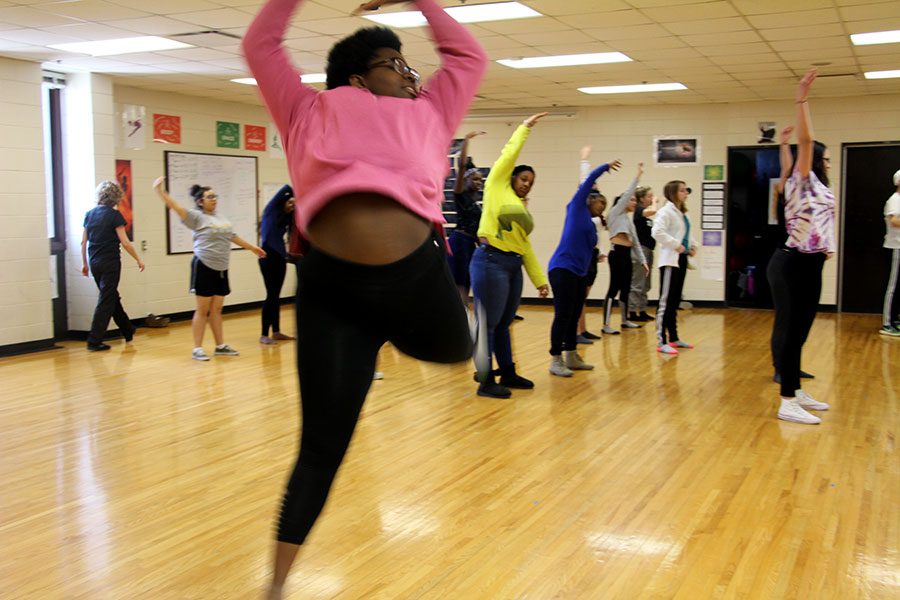Support black students-teach black history
Being black in America right now is a complicated experience. “Sometimes it’s good and you’re feeling it but other times you’re scared and other times you’re angry it’s like going through a whole range of emotions at once like there’s no emotion to explain it,” explained sophomore Elise Cuff. Here, Cuff relaxes in her dance class.
South has recently concluded Black History Month and there are some African American students at South who are passionate about their history and how they feel their history is being appreciated at South.
For many African Americans, being black in this country, especially now with the Trump administration, is a very scary, different, and proud way of life. I was curious about how students at South felt about being black and how South helps or doesn’t help the feeling.
Sophomore Ciara Williams doesn’t care about how much easier it would be to live with white privilege. “It feels good to be black in America. I wouldn’t want to be white or any other race. I want to be my race,” she explained. Someone who’s helped black people in America feel proud about their race is Martin Luther King. He was known for being a leader in the civil rights movement. He’s important because he fought peacefully for African Americans to have equal rights as whites. Martin Luther King “inspires me because he’s the reason that we’re equal,” said Williams. “He had so many dreams.”
Now, many people feel our leaders aren’t quite as “progressive” as King was. “I don’t even know how to feel being black in Minnesota because Trump is racist,” said Williams. Like most most people of color, Williams has been affected by Trumps election and the events post November.
One way for black people to keep their head up through Trump’s leadership is feeling that they are being educated on the significance of their culture so that while Trump degrades them, they can try to stay proud. “I don’t feel feel that African American history is appreciated at South because in Black History Month our history teachers never do anything about it,” said Williams.
Sophomore Corey Siggers is afraid of police violence because she is black. “It’s scary to be black in America. Ain’t no telling what the police gonna do to you because they judge you just the way you look.”
Through her fear of the police, Siggers stays strong by looking up to people like Derrick Rose. He is an American professional basketball player for the New York Knicks. He “inspires me because we’re from Chicago and I feel he got a lot of things accomplished.” Aside from being a professional basketball player, Rose also donated $1 million to After School Matters, a program for teens in Chicago. It helps teens in Chicago to stay in school and out of the streets.
My last interview was with sophomore, Elise Cuff. “It’s an experience to be black in America because sometimes it’s good and you’re feeling it but other times you’re scared and other times you’re angry it’s like going through a whole range of emotions at once like there’s no emotion to explain it.”
Someone who does a pretty good job explaining it through her lyrics is Beyoncé. Beyoncé recently dropped an album called Lemonade where she has lyrics that make her seem really strong, especially in her song “Formation.” She is an inspiration for Cuff.
“I also look up to Laverne Cox,” said Cuff. Laverne Cox is an American actress, and LGBT advocate. Laverne Cox is known for her role as Sophia in the popular TV show, Orange is the New Black. She also played Frank N. Furter in the Rocky Horror Picture Show. “She’s also trans and it’s really nice to have someone like that,” said Cuff.
Like Williams, Cuff looks up to people like Beyonce and Cox in order to have people to be role models since Obama is out of office and so they no longer look up to the president. “I feel like after the election people’s true colors are coming out, because when you think of Minnesota, you think of it being more liberal,” Cuff said. Minnesota isn’t all that diverse: 85% percent of white people and 5% percent of black people.
South does have a student group called UMOJA. Umoja means “Unity” in Swahili. It’s for students with African and African American descent. “I don’t think my history is appreciated at South like look at UMOJA,” said Cuff. She explained that she felt that South was expecting UMOJA to do things to enhance South and she felt like South should be doing more to support UMOJA.
While interviewing Cuff, Siggers, and Williams, I learned that they are three representatives of a large group of people who want to be represented and appreciated more in our educational curriculum. They have a lot of great role models who they don’t learn about in school the way kids learn about Abraham Lincoln, Clara Barton, and even Elvis in the classroom. African American students at South should be given a chance to express themselves and know how their culture is important here.











